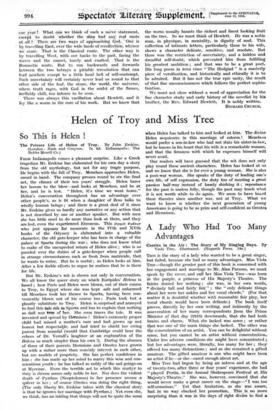Helen of Troy and Miss Tree
So This is Helen !
The Private Life of Helen of Troy. By John Erskine. (London : Nash and Grayson. 7s. 6d. Indianapolis: The Bobbs-Merrill Co.) FROM Indianapolis comes a pleasant surprise. . Like a Greek tragedian Mr. Erskine has elaborated for his own day a story from the old mythology, but not for any tragic purpose. He begins with the fall of Troy. Menelaos approaches Helen, sword in hand. The company presses round to see the final act, the climax of their ten years' struggle. Helen bares her bosom to the blow—and looks at Menelaos, and be at her, and he is lost. "Helen, it's time we went home." Helen's conversation throughout has an advantage over other people's, as is fit when a daughter of Zeus talks to wholly human beings ; and there is a great deal of it since Mr. Erskine gives us hardly any narrative or any action that is not described by one or another speaker. But with men she has little need to do more than look at them, and they. are lost, even the experienced Eteoneus. This drimpbs Oepcircur who just appears for moments in the IVth and XVth books, of the Odyssey is elaborated into a valuable character, the old gate-keeper who has been in charge of the palace at Sparta during the war ; who does not know what. to mike of the unexpected return of Helen alive ; who is so puzzled over the duties of a gate-keeper when people call in strange circumstances such as fresh from matricide, that. he wants to retire. But he is useful ; so Helen looks at him. After a few feeble efforts to argue he realizes that he is there for life.
But Mr. Erskine's wit is shown not only in conversation. We all know the queer story on which Euripides' Helena is. based ; how Paris and Helen were blown, out of their course to Troy, to Egypt where she was kept safe and unharmed till Menelaos took her thence to Sparta, having been con- veniently blown out of _his course too ; Paris took but a ghostly substitute to Troy. Helen is surprised and annoyed. to find this tale rife in Sparta andhas to explain that nothing so dull was true of her. She soon traces the tale. It was invented and spread by Hermione ! Helen's extremely proper child had missed a 'mother's care and had grown up not honest but respectable, and had tried to shield her erring. parent from scandal (would that Cambridge could hear the, echoes of Dr. Verrall's laughter-- at an explanation of the Helena so much simpler than his own !). During the absence of three of their parents Herznione and Orestes have grown up with a rather more than cotisinly interest in each other, but are models of propriety. She has perfect confidence in him ; she has made up her mind to marry this wise and con- scientious youth : he has talked so nobly of the sad goings-on at Myeenae. Even the terrible act to which this martyr to duty is driven seems only noble to her. Nor does the violent death of Pyrrhus (Neoptolemus) in her presence arouse a quiver in her ; of course .0frestes was doing the right thing. (The only liberty Mr. Erskine takes .with 'the classical story_ is that he-ignores her marriage-with -Pyrrhus.) Yet even she, we think, has an inkling that things will not be quite the same
when Helen has talked to him and looked at him. The divine Helen acquiesces in this marriage of esteem! Menelaos would prefer a son-in-law who had not slain' his sister-in-law, but he knows in his heart that his wife is a remarkable woman, and that the firmness with which he expresses himself will never avail.
Our readers will have guessed that the wit does not only play round these ancient characters. Helen has looked at us and we know that she is for ever a young woman. She is also a post-war woman. She .speaks of the duty of leading one's own life, of self expression, the duty too of meeting a great passion half-way instead of basely shirking it ; repentance for the past is useless folly, though the past may teach what it is not worth while to do again. We seem to have heard these theories since another war, not at Troy. What we want to know is whether the next generation of young Americans is going to be as prim and self-confident as Orestes, and Hermione.






















































 Previous page
Previous page